Politics and Theatre
Does Each Serve the Other? Presidential Candidates on Stage
Which debate exchange is wackier?
Questioner: What are your views on same sex marriage?
Trump: I think marriage should be between a man and a woman. I’ve been married three times and every time it was to a woman. A beautiful, younger woman.
Or
Questioner: Earlier this month, you said she doesn't have, quote, “a presidential look.” What did you mean by that?
Trump: I said she doesn't have the stamina. And I don't believe she does have the stamina. To be president of this country, you need tremendous stamina.
Questioner: The quote was, "I just don't think she has the presidential look."
Trump: You asked me a question. Did you ask me a question?....You have so many different things you have to be able to do, and I don't believe that Hillary has the stamina.
The second exchange is from the first debate between Donald Trump and Hillary Clinton, sponsored by the Commission on Presidential Debates.
The first took place earlier that same day at New World Stages, “sponsored by Yahoo’s email security team, Wells Fargo, and Hair Club for Men.” Trump and Clinton were puppets, designed by Avenue Q’s puppet maker Ricky Lyon and operated by past Avenue Q actors (and married couple) Maggie Lakis and Rob McClure.
It was a “mock debate,” Town Hall style (At one point, Kate Monster asked: “Should I be worried about being stopped and frisked because I’m a person of fur?” The Trump puppet replied: “I promise I will treat all minorities the same, whether you are a Mexican or an Oriental or a Monster. And by all the same, I mean you’ll all be deported.”)
Can theatre serve the political moment?
But is staged mockery even possible in the current presidential election contest? Or as the introduction to a special section of American Theatre magazine on politics and the election puts it: “When the shape of reality already suggests the distorted grotesques of a funhouse mirror, what kind of mirror can the drama possibly hold up to it?” And is mockery the right approach anyway when so many people see the stakes this time around as so high?
Can theatre serve the political moment? Some recent works on stage in New York all attempt it.
Politics without Politicians
What Did You Expect? is the second installment of Richard Nelson’s election-year trilogy, subtitled The Gabriels: Election Year In The Life Of One Family. Like the first installment in March, Hungry, the play is set on the day it opens (with Nelson having added and rewritten right up until the opening), and unfolds in real time as the members of the Gabriel family prepare and consume a meal. The series focuses on the members of a family living in the Upstate New York town of Rhinebeck. Hungry was one of the three theatre pieces I focused on in my essay for HowlRound in April, “Could A Play Stop A Demagogue? Theatre and Electoral Politics.”
I was surprised that in Nelson’s first play there was only an oblique mention of Donald Trump, even though Hungry opened and was set the day after the notorious 11th Republican Presidential debate in which Donald Trump boasted about the size of his penis. Maybe the playwright did not have the time to work that in, I thought at the time.
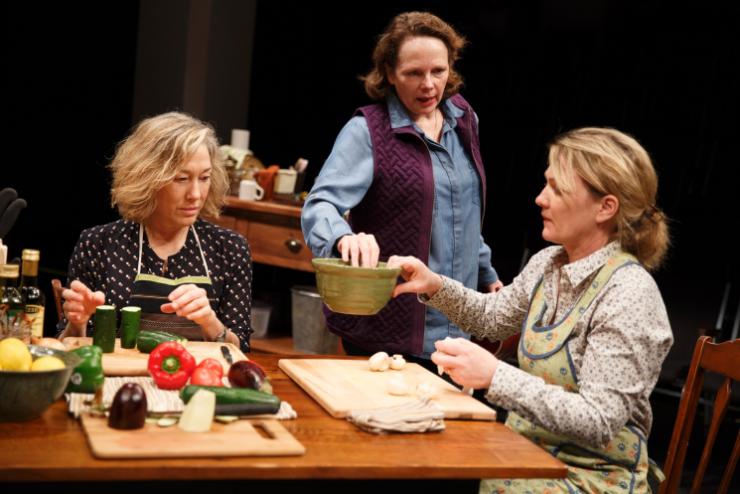
But in this second of Nelson’s plays, Trump’s name is mentioned only once—and Clinton’s not much more than that. What to make, then, of the subtitle, Election Year in the Life of One Family? Perhaps it is Nelson’s point that election years do not—or at least should not—revolve around politicians, but rather around the people that politicians are supposed to serve. It must also be satisfying to refuse to help Trump monopolize the civic conversation. Yet, I left What Did You Expect?—a subtle, well-acted glimpse at the way we live now—with the nagging feeling that the playwright had abdicated his responsibility by leaving out the election in an “Election Year” play, an election that many of us are struggling to make sense of. One can easily argue that it’s not his job to make sense of it, but I also felt misled. What did I expect, indeed.
Politics as Performance Art
Two seasoned theatre artists have taken on the job of portraying one or both of the presidential candidates, although neither performer attempts a precise impersonation; the candidates are filtered through the artists’ own vivid theatrical personas.
Performance artist Karen Finley’s Unicorn Gratitude Mystery was actually three short theatre pieces presented together. In Gratitude, Finley approximates the look and attitude of Hillary Clinton, beginning with a cheerful if not quite coherent expression of her gratitude—“I am so grateful—not that I am great—but I am great full—full of greatness—gratitude is my attitude”—which soon devolves into a raunchy rant about former President Bill Clinton’s infidelities and Monica Lewinsky’s blue dress.
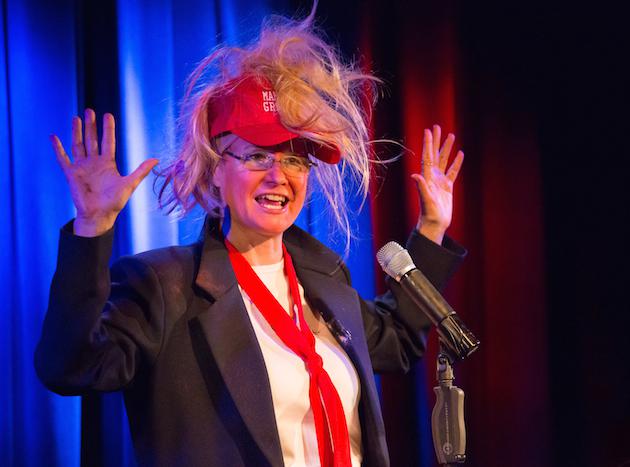
In Mystery, Finley wore a “Make America Great Again” cap and an absurd hairpiece, and recited what sounds like verbatim sentences from Donald Trump, although they took on an antic tone. She soon transitions once again into the obscenely surreal, where Trump is lascivious, needy, and literally girlish:
My hair is Faye Dunaway’s running away in Bonnie and Clyde…I am platinum blonde…I am Eva Marie Saint kissing Cary Grant on the train, Grace Kelly’s close up, Kim Novak in Vertigo…
As odd as Finley’s poetic ranting is, it holds an odd power, helping us see the ways that we as individuals and collectively like to cover up the seamier realities of our existence with a gloss of happiness and cheer. Finley seems to be using the candidates less as politicians or as even specific people, but as metaphors for American culture.
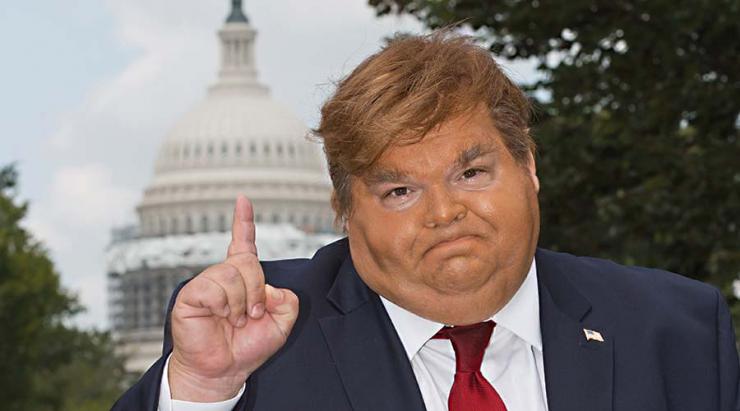
Mike Daisey’s The Trump Card is a more straightforward monologue that Daisey has been performing around the country; he has also put the script in its entirety online in hopes of spurring other productions. It soon becomes apparent that what interests Daisey most about Trump is the candidate’s skills as a performance artist. “I understand him because he and I are both performers, and we work with the same toolset.” I would have loved for Daisey to elaborate on this idea in the monologue. He didn’t do so on stage, but he did in an essay for that election section of American Theatre. It’s worth quoting at some length:
Watching Trump’s speeches for months made it clear to me how much he was a creature of the theatre. And because the political establishment doesn’t understand theatre, it left them wide open to infection and domination…Trump’s popularity doesn’t erode when he lies because the people supporting him are supporting a lifelong performer. When they hear him say things that aren’t true, they don’t hear a trusted source betraying them…. People don’t expect Donald Trump to tell the truth because he’s inoculated himself by being deeply authentic—authentically a person who makes up shit all the time…The people who don’t care that Trump tells the truth aren’t idiots who don’t understand how the world works. They are much savvier than that, and the situation is much more dangerous. They know he is spinning a story, and they like the performance so much they have actively decided that they do not care.
This doesn’t ring true to me, but it is an intriguing analysis, and I am sorry Daisey did not put more of it into his monologue. Instead he spends much time telling anecdotes about Trump’s racist father Fred and horrid attorney Roy Cohn. Daisey also recounts holding a party to play “Trump: The Game,” which he describes as “essentially Monopoly for dogs,” a gathering at which he served Trump Steaks and Trump Water. It struck me that Daisey was asking the audience, in effect, to consider The Trump Card as entertainment, not reliable civic discourse.
After I made this observation in a review, Daisey wrote to me: “I don't know if it's entertainment; I certainly don't mind being entertaining. I certainly hope never to be creating reliable civic discourse—I'm a narrator, after all, and therefore unreliable. “
Can Theatre Provide Reliable Civic Discourse?
It was interesting to read that five theatres in Washington DC have joined together to stage politically relevant plays every Monday until Election Day. One new one, written by Josh Harmon, has the Fringe-like title Ivanka: A Medea for Right Now. But several are old plays that served as warnings about the rise of demagoguery and Fascism—Bertolt Brecht’s The Resistible Rise of Arturo Ui, Lillian Hellman’s 1941 Watch on the Rhine, Budd Schulberg’s 1957 A Face in the Crowd.
Similarly, as I wrote here in March, the New York-based Peccadillo Theater Company put on a staged reading of It Can’t Happen Here, Sinclair Lewis’ cautionary 1936 play, which includes the remarkably familiar promise by the would-be dictator candidate to “build a wall…” Berkeley Rep in California has now taken on that same play six months later.
Even Shakespeare is being enlisted as a campaign worker of sorts. In its promotion of its production of Coriolanus that is opening at the end of this month, Red Bull Theater describes the play in part:
Economic inequality strains the social fabric. Debates rage throughout a nation riddled with dissension and distrust. It’s election year in Rome, 493 BCE, and as unscrupulous politicians manipulate public opinion, the hypocrisy and humiliation of political campaigns drive away the country’s finest…
Will any of these works serve to rally the citizenry, or at least spark serious political contemplation?
Some see theatre and theatre artists as especially equipped for direct action, as I explored in this piece on Broadway for Black Lives Matters, and on Theatre of the Oppressed NYC. Organizing protest rallies, academic Frank Roberts said, “takes directorial vision and composition and theatricality and choreography—all the things that artists are naturally inclined to provide.”
Will any of these works serve to rally the citizenry, or at least spark serious political contemplation?
As they did during the primary season, Paul Bedard and his Theater in Asylum company are holding debate watch parties, and then plan to select from the debate transcripts to create a theatre piece shortly before the election. It’s worth repeating much of what he said to me during the primaries:
There is so much information in an election year. I believe it is the artist's duty to help make sense of it all, not with more information, but with interpretation, narrative, color, sound, story. Art helps us understand the stakes, the context, and the humanity within the chaos.
As with the shows I’ve seen by Theatre of the Oppressed, the debate show I saw by Theater in Asylum was not great art. The quality of the stagecraft seemed, at best, of secondary importance. But its playful pop sensibility has the explicit purpose of engaging the political moment—of getting the audience to vote.
A similar impulse brought the cast of Hamilton outside the Richard Rodgers last week to register people to vote. Volunteers are doing the same outside the New York Theatre Workshop every day until the election.
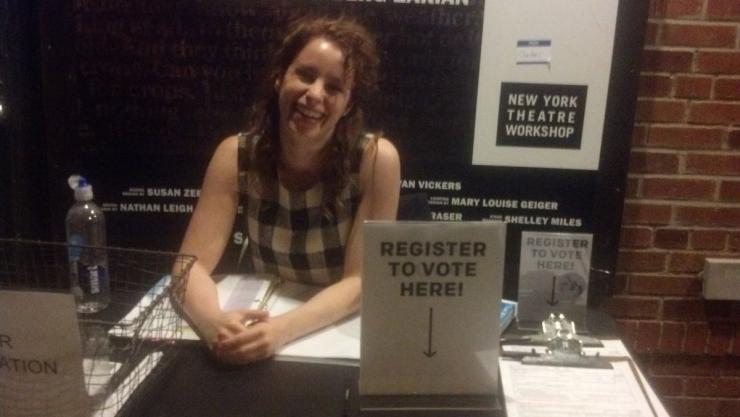
***
Jonathan Mandell’s Newcrit piece usually appears the first Thursday of each month. See his previous pieces here.

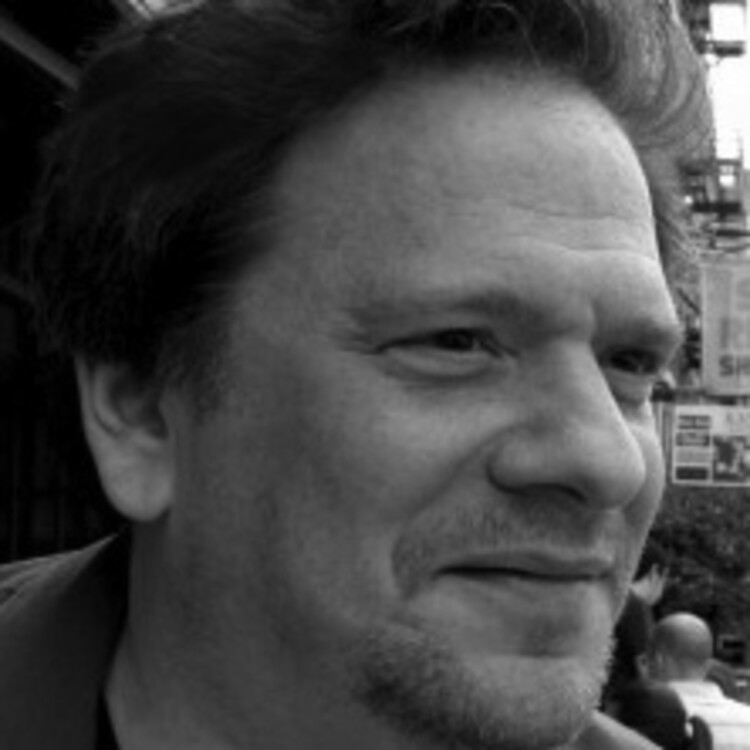
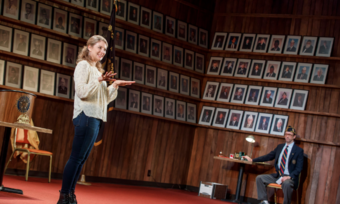

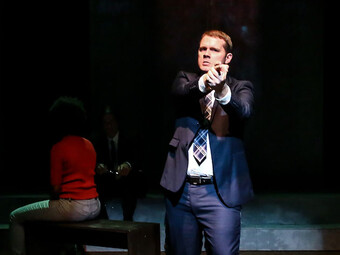

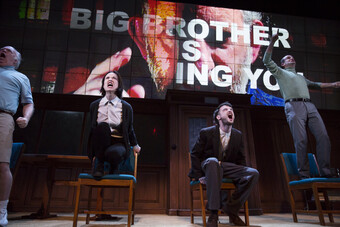
Comments
The article is just the start of the conversation—we want to know what you think about this subject, too! HowlRound is a space for knowledge-sharing, and we welcome spirited, thoughtful, and on-topic dialogue. Find our full comments policy here